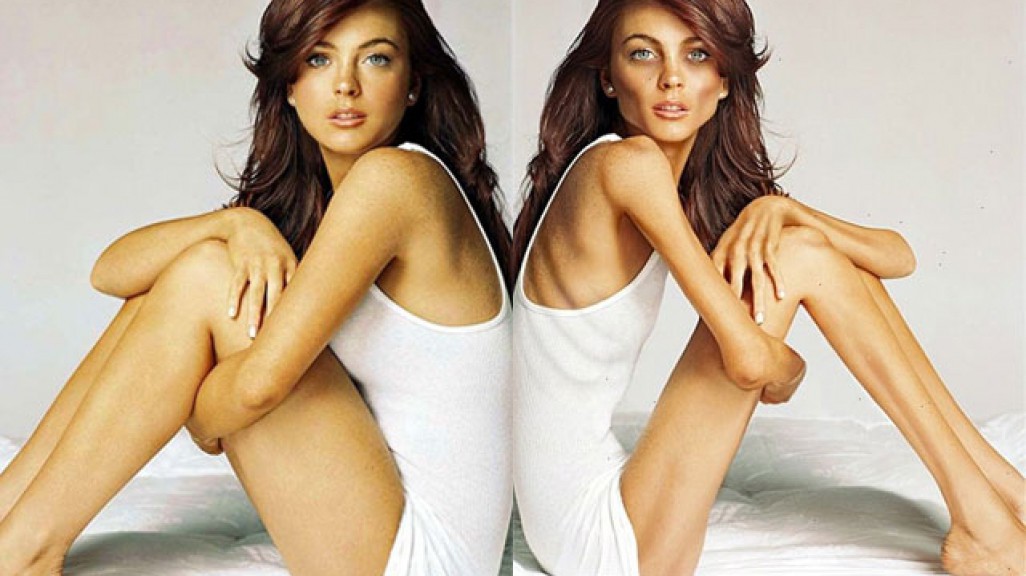
What is anorexia? Why is it developing and how does it manifest? How to treat anorexia?
The content of the article
- Anorexia - What is this disease, its views?
- Video: Anorexia: Causes, Signs, Tips
- Nervous Anorexia: Symptoms and Causes
- Video: Nervous Anorexia
- The initial stage of anorexia: What weight begins?
- Stage anorexia
- Consequences of anorexia for the body
- Death from anorexia
- Anorexia girls and women: reasons, initial signs, photos
- Anorexia Guys and Men: Causes, Initial Signs, Photo
- Anorexia of adolescents and children: reasons, initial signs, photos
- Video: Anorexia in adolescents. Causes, Symptoms, Prevention
- How to cure anorexia in adults and children? Medication and drugs from anorexia
- Power with anorexia to gain weight
- Anorexia: before and after
- Bulimia, cachexia, dystrophy and anorexia: What is the difference?
- Anorexia Stars: Victims
- Prevention of anorexia
- Video: Anorexia
Once a great thinker Socrates said "Non Ut Edam Vivo, Sed Ut Vivam Edo" ("We eat to live, but do not live, so that there are"), and his words became aphorism. Indeed, a person is a reasonable creature, and his life is not built exclusively around the extraction and meal.
Reassessment of the significance of nutrition in a person's life, exactly as its underestimation, is fraught with the appearance of disorders of food behavior, such as anorexia, bulimia, nightliness, so on. These disorders are able to harm health, and their correction may take months and years.
Anorexia - What is this disease, its types?
Anorexia is a violation of food behavior due to the physiological or psychological, which is expressed in the absence of appetite, ignoring the natural need for food and reducing the weight of the patient.
Important: The absence of appetite with anorexia is resistant and long. Call a person who did not eat one or two days, absolutely unfair. The patient anorexia does not just do not want to eat, his body seems to reject food. In response to attempts to take the patient, it can be sick and tear. And even a small amount of eaten causes his unpleasant feeling of overeating.

With anorexia, the patient refuses meals and rapidly loses weight.
Usually, the causes of anorexia are:
- depression and chronic stress
- concern about their excess weight
- violation of metabolism and diseases of the endocrine system
- parasitic diseases
- alcoholic and narcotic dependence
- oncological disease
- intoxication
Anorexia, not related to diseases of the internal organs, is most often diagnosed with adolescents and young women. It is usually a disorder, as a rule, arises against the background of concerns overweight, obsession with weight loss, and is accompanied by an obsessive state.

Anorexia is subject to women, pathologically concerned about their appearance and weight.
Important: from anorexia is a large percentage of mortality. Moreover, the fatal outcome occurs both from irreversible disorders in the body caused by protein - energy failure and because of suicide.
Anorexia is classified for the following types:
- Primary. This species is diagnosed in young children with disorders of digestion and / or metabolism, as well as in patients with violations of hormonal, oncology or pathologies of the nervous system.
Mental. The refusal of food intake in this case is due to a psychiatric disease as the depression, the obsessive fear to poison, obsessive fear to recover, so on. - Symptomatic. Anorexia may not be an independent impairment, but a symptom of another disease, such as digestive organs, respiratory organs, reproductive system, so on. Temporarily anorexia can be observed in acute infectious diseases when the body sends all the forces on the fight against the pathogen agent, while the feeling of hunger is dulled or disappeared at all ..
- Drug. In this case, targeted events are carried out in order to deprive the patient of hunger, as it is necessary to treat any other disease.
- Nervous (psychological). In this case, the pathological condition is provoked by the desire of the patient to lose weight, sharp restrictions in food or complete refusal.
VIDEO: Anorexia: Causes, Signs, Tips
Nervous Anorexia: Symptoms and Causes
It is impossible to deny the problem of excess weight. In developed countries, some and critical number of extra kilograms have two third men and women. Fullness or obesity - the problem is not only aesthetic, overweight agitates the life of chronic diseases, reduces its duration, reduces quality. WHO Calls upon: It is necessary to lose weight! But, lose weight correctly, without harm, the body is gradually, rational.

Anorexia nervosa is caused by the desire to lose weight or fear of gaining extra weight.
At the same time there is a cult of thinness. Models, movie stars and music slender, sometimes too thin. But they are sex - symbols, the standard of beauty. They are equal to the youth.
At the same time the second type of beauty, juicy, rosy-cheeked, pushed into the background. The girl with the weight of 55-60 kg and normal body proportions feels thick, and it is a big problem.
On the other hand, people really are overweight, who managed to bring it down to normal, may be pathologically afraid to get better again. In both these cases, it may be a conscious refusal to eat, develop nervous (psychogenic, neuro - psychological, mental) anorexia.
IMPORTANT: The patients with anorexia nervosa has a pathological fear to get better or become obsessed with the idea to lose weight. He thinks that each spoonful of food eaten is able to hurt him. First, he flatly refuses harmful, carbohydrate or fatty foods, and later - and by useful products. Still later, he can and does stop there.

A patient with anorexia nervosa may completely refuse to eat.
Anorexia nervosa develops due to:
- from mental disorders (obsessions)
- features of education in the family
- inspired by the stereotypes of society
In a patient with anorexia nervosa observed following mental disorders:
- He lives with the obsessional idea to lose weight. It links all the problems with being overweight. If you do manage to lose weight, there is a fear to get better again.
- The patient does not want to eat. First he forces himself to refuse food, and later have it already do not really want to. Moreover, to admit he does not want others. A teenager can tell parents that do not eat at home, throw food.
- The patient himself physically exhausting. Each resulting calorie it tends to work out twice. He continues to train despite the lack of energy than aggravate their condition. There is a feeling of weakness, irritability, and insomnia.
- Anorexic does not recognize that his painful condition. He can not hear others, he denies the existence of at symptoms of eating disorders and symptoms related health disorders. Arose the desire to eat, he actively suppresses. His motto, like an alcoholic or drug addict - "I'm all right."
- The patient limits himself in communication. Firstly, he feels flawed due to imaginary excess weight, secondly, he is annoying the comments of the surrounding behavior and appearance. Problems in communication adds irritability, which arose in a patient as a complication of anorexia.
- He has sexual disorders. In particular, on the background of refusal to eat and reduce body weight reduces libido.
- Disability and ability to learn from anorexic are catastrophically reduced.
- Anorexics are prone to self-insulation.
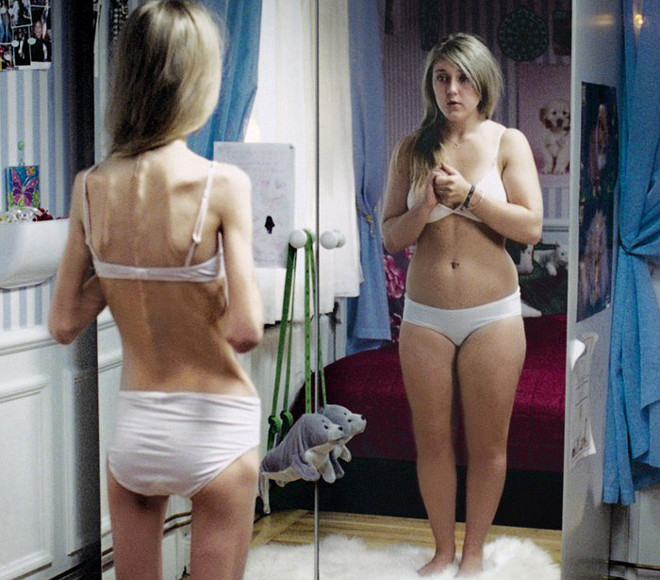
Anorexic denies the presence of the problem, it may seem to him that he is still fat.
Physiological signs of nervous anorexia are:
- a sharp decline in body weight following jumps in loss - set
- changes in the proportions of the figure
- deterioration of hair, leather, nails, teeth
- caused by hypotension weakness, fast fatigue, headaches
- cardiac arrhythmia
- swimming joints and pain in them
- malgy
- the emergence of problems with the gastrointestinal tract (constipation, disorders, inflammation of the mucous, gastritis, ulcerative disease)
- violations of metabolism
- menstrual disorders or complete lack of menstruation in women
- reduced potency in men
- sleep disorders, insomnia
Video: N. erval Anorexia
The initial stage of anorexia: What weight begins?
Answer anorexia begins with what weight is quite difficult:
- at the initial stage of any significant weight loss may not be.
- if anorexia is manifested in a person with obesity, he can lose weight sharply, with his weight in the stands of norm.
- khudoba is an individual, weight, too small for one person, can be quite normal for the other.
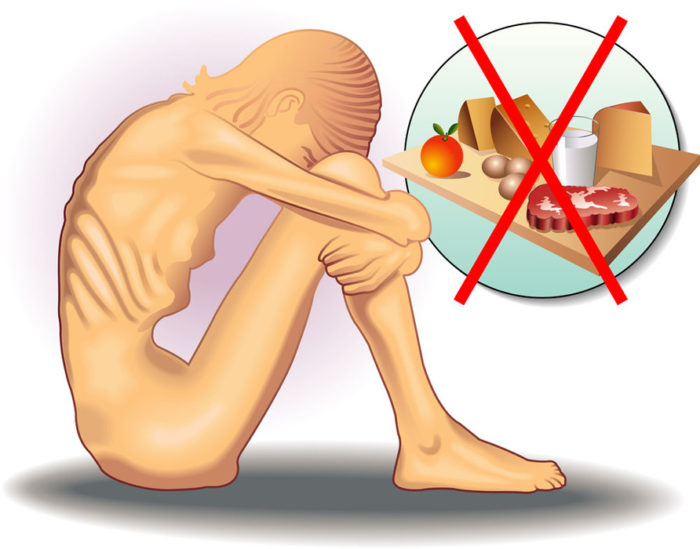
Refusing to food and exhausting themselves physically, a sick anorexia can lose from 20 to 50% of their weight.
The only option to determine that anorexic weight is significantly lower than the norm - to calculate the mass index of its body.
BMI is calculated by weight ratio in kilograms for growth in meters. Weight must be divided into growth. The normal indicator can fluctuate within the values \u200b\u200bfrom 18.5 to 25. Everything that is higher is overweight or obesity, everything that is lower, speaks of excessive hood, possibly due to anorexia.
Stage anorexia
Doctors and nutrition specialists distinguish between four degrees of anorexia:
- Initial (or disextempophobic). During this period, a person has discontent with its own appearance and weight. It seems to him that the weight and disadvantages of the figure are the main reasons for his unsuccessful in their studies, personal and public life, at work, so on. At the same time, the division of the surrounding on it does not work. Often the initial stage of anorexia lasts for several years and falls for the period of puberty of guys and girls.
- Domoropomanic. At this stage, the patient moves to active actions to correct its imaginary disadvantages: consciously reduces the diet or completely refuses food, causes vomiting, drinking diuretic and laxatives, exhausts itself physically, the like. It loses from 15 to 50% of the weight, spreads in its body.
- Cachectic. The patient's body is exhausted. It occurs in somatogormal disorders. The work of all organism systems is located: the body temperature decreases, the heartbeat slows down, the hell drops, dystrophic changes in muscles and skin occur, anemia develops, there are no menstruation in women. The patient begins to experience a feeling of hunger, but at the same time still thinks he needs to lose weight. Physical activity is reduced so much that the patient spends all the time in bed. There is a threat to his life. The patient needs hospitalization.
- Reductions. It comes after the treatment of anorexia, eliminating some of its symptoms and the gain of the patient in weight. Drain ideas are returned, the patient again performs attempts to lose weight, the same as during the dismorticational stage.
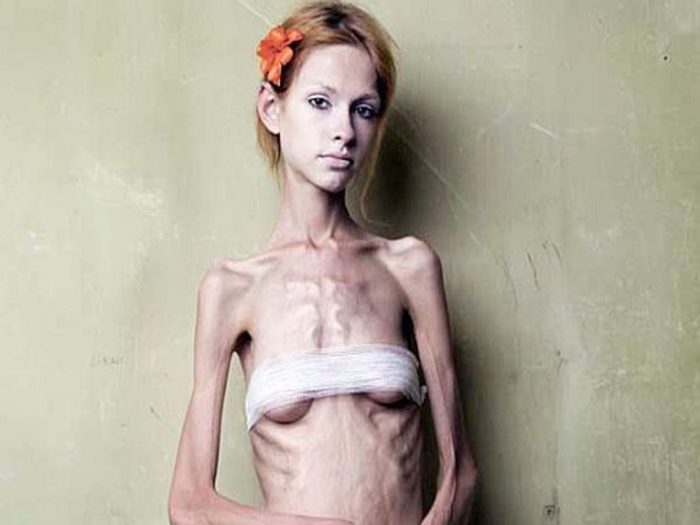
Progressive anorexia is a threat to life.
IMPORTANT: Patients with anorexia, especially those who have passed the cached stage need supervision and support. And not only from relatives and relatives, but also competent specialists - a nutritionist and a psychologist.
Consequences of anorexia for the body
The consequence of anorexia and children, adolescents and adults is protein - energy failure. Pathology develops by virtue of chronic lack of all macronutrients, as well as vitamins and minerals. Its manifestations can be different, from the deterioration of the condition of the skin and hair to multi-barred to multisystem deficiency.
Against the background of anorexia and protein - energy failure, such disadvantages in the body may be observed:
- violations of the gastrointestinal tract (disruption of digestion of food, gastritis, enterocolitis, other)
- metabolic and endocrine disorders (hyperthyroidism, adisson disease, adrenal insufficiency, pancreatic failure, hormonal failure)
- violations of the cardiovascular system (decreased blood pressure, slowdown of the pulse, anemia, reduction of vessel tone)
- failures in the work of the reproductive system (insufficient production of female and male hormones, amenoria, decline in libido, infertility)
- muscular dystrophy
- destruction of bone and connective tissues
- neurological disorders due to deterioration of the brain
- reduced immunity
- development of depressive and obsessive states
- texture to suicide
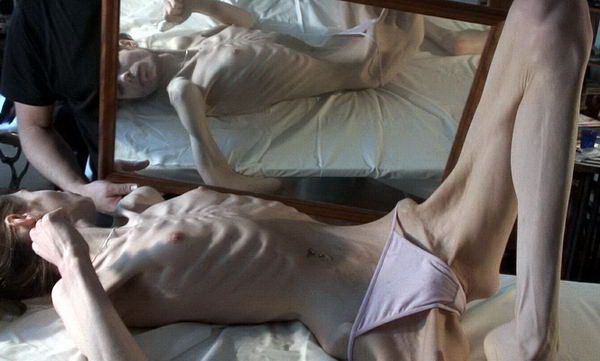
The terrible consequences of anorexia are exhaustion, multichang and multicurbed failure and death.
Death from anorexia
According to medical details, 20% of cases of anorexia may end with fatal outcome. Death comes from:
- exhalation
- multichang or multisystem failure
- due to suicide

Patients anorexia often finish with suicide.
Anorexia girls and women: reasons, initial signs, photos
Anorexia is mainly discovering in girls - adolescents and young women. They are most often obsessed with slimness, the desire to lose weight, look like actresses, models and singers.
Of the disorder of food behavior they have provoked:
- improper upbringing, when, from the small years, parents assure that a beautiful girl should be thin, reproach the child for eating too much, so on
- understated self-esteem when a girl or girl thinks she is ugly, and because of this, something in her life does not work
- lack of attention and love

One of the reasons for anorexia in women is passionateness too thin models.
Parents can suspect the daughter anorexia if:
- she talks a lot about weight loss, all the time weighed, looking at himself in the mirror, openly talks about the disadvantages of appearance or its fullness
- often sitting on diets, Caloras believes
- eats little, trying not to eat at home or not at the dinner table, in my room, for example, so that no one was sitting at this time
- for a long time, it is in the toilet (this is given to know the provocations of vomiting, experiments with diuretic and laxative, and later - problems with digestion)
- for too much training
- quickly loses weight, lose weight too much
- quickly tired, her head is spinning
- successes in her studies get worse
- she becomes closed, does not want to communicate, is isolated from friends
- its appearance is noticeably worsening: the skin and hair faded, the hair is shaking, fall out, the nails are smelling and thinned
- she more often sick and difficult to recover
Anorexia Guys and Men: Causes, Initial Signs, Photo
Men are sick anorexia 30 times less often than women. Usually, these are young people who:
- as a child, they suffered over weight, on this occasion they had a complex
- have a history of mental illness
- must follow the appearance of work and social status
- suffer from lack of attention from women
Symptoms of this disorder in men are similar to the symptoms in its own women.
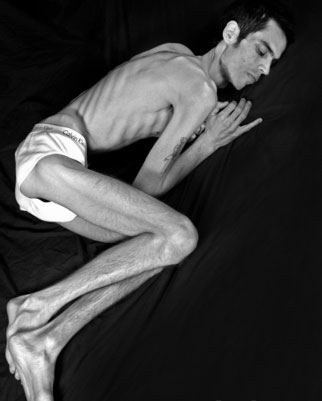
Anorexia in men.
Anorexia of adolescents and children: reasons, initial signs, photos
Anorexia is a disorder of food behavior for each third child up to 3 years. Fearfully? And the parents are to blame. Failure to eat kids is explained by feeding forcibly. A child cannot clearly tell if he wants to eat at all and what exactly. It has an improper, negative attitude towards food.
Anorexic child has the following deviations in behavior:
- at the table, he climbs, by any means trying to abandon meals: does not open the mouth, spits, so on
- after eating the baby jeeps or tears
- child is difficult to even sit down at the table
- he does not eat anything with pleasure that he is offered

Anorexia may suffer even small children.
At the older age, the causes of anorexia can be:
- excess weight
- natives of parents about excess weight
- offensive words, mockery from other children
The symptoms of the disorder are the same as in adults.
VIDEO: Anorexia in adolescents. Causes, Symptoms, Prevention
How to cure anorexia in adults and children? Medication and drugs from anorexia
Anorexia in adults and children is treated with complex, often in the hospital. Therapy includes:
- Group and individual classes with a psychologist. The patient teach adequately to treat his body, corrected his attitude towards food, help to get out of the depressive state.
- Receiving medication.
- Dietherapy. The nutritionist puts the goal - to stabilize the processes of digestion and metabolism in the patient, help overcome the effects of anorexia for the gastrointestinal bodies, help the patient to gain weight.
- Treatment of anorexia consequences. It is necessary to reveal what diseases and violations entailed a refusal of food, and to treat them.
Medicate anorexia treat:
- antidepressants and neuroleptics (fluoxetine, Olanzapine, Stelzine, Prozak, Others)
- hormonal drugs
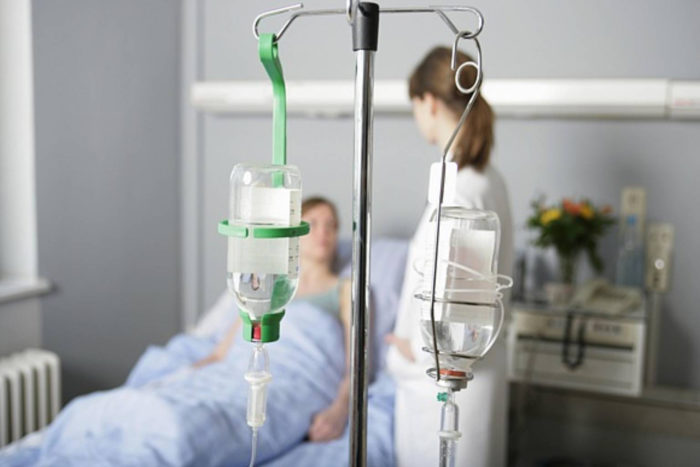
Patients with anorexia often need immediate hospitalization.
Power with anorexia to gain weight
Power with anorexia for restoration and weight gain is built on the following principles:
The volumes of food consumed increase gradually, since the body is canceled to process it
- food must be fractional
- at first, preference should be given to liquid and puree, crushed dishes.
- the calorie content of the diet should be increased (this does not mean that it is necessary to become a frequenter of fast food, calories are recruited from KASH)
- it is necessary to use protein food (meat, eggs, dairy products)
- the necessary organism at this time fats - omega - 3 and omega -9, there are many in fish and products of plant origin
- nutrition should be vitamined (there are more vegetables and fruits)
- normalize the process of digestion dairy products
- introduce vitamin and protein cocktails in the diet
- in addition to food, food additives should be consumed - fish oil, vitamin and mineral complexes
Important: in critical cases, if anorexic is completely refused food, the first time it is fed through the probe.
Anorexia: before and after
Many people who have suffered anorexia managed to recover, adjust the food behavior and gain weight even to the size of the plus. Results can be seen in the photo.

Anorexia: before and after.

This girl was able to defeat anorexia and gain weight until the size of the plus.
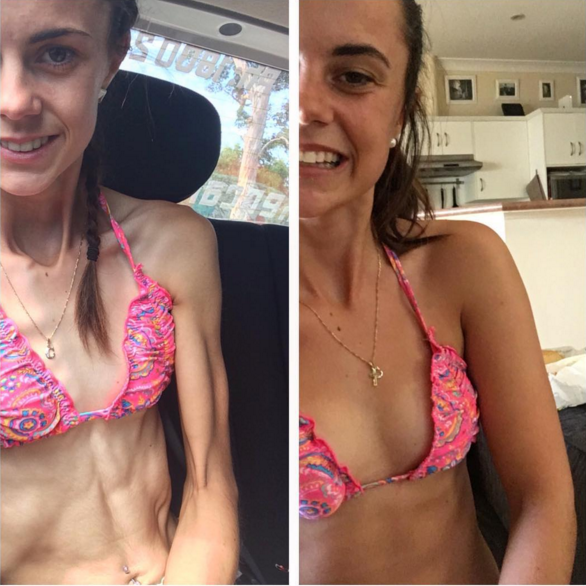
Anorexia: photo during and after illness.
Important: Stars, simple guys and girls who have endured anorexia, often lead diaries on the Internet. Their stories can be useful to those who are now fighting this problem.
Bulimia, cachexia, dystrophy and anorexia: What is the difference?
In addition to anorexia, there are other disorders of food behavior:
- Bulimia. In this case, a violation of a person is constantly hungry, his feeling of hunger in the literal sense does not take. He overeats, even consuming a large amount of food, does not feel satisfying. After, feeling guilty, he tries to "clean", causing vomiting, consuming a laxative, exhausting itself physically. Sick Bulimia flows into depression, becomes closed. Its metabolism slows down, the liver, stomach, teeth, heart suffer. Due to frequent vomit, tonsillites and pharyngitis arise (the contents of the stomach annoys the mucous membrane of the respiratory tract). Bulimia is treated with psychotherapy and medicines.
- Cachexia. This pathology is a refusal of food, loss of appetite without a desire to the patient. Exhaustion in this case can be caused by the defeat of the hypothalamus, in which the center of appetite is located, other internal diseases, as well as impaired psyche.
- Dystrophy. It is not a disorder of food behavior, but by pathology affecting cells, tissues and organs associated with the metabolic disorder in them.

Bulimia: Behind the attacks of the increment should be vomiting.
Anorexia Stars: Victims
Models, movie stars, pops and theater are public people, appearance for them plays a considerable role. Plus, their life is constant stress. It is not surprising that among them a lot of victims of anorexia.
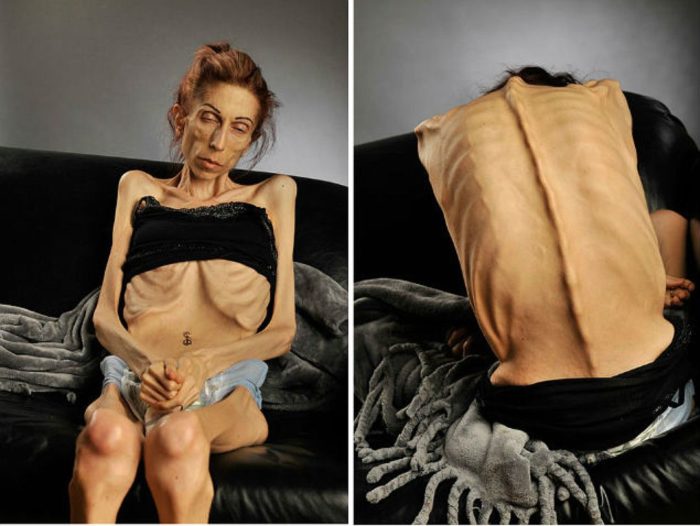
Actress Rechel Farrech.
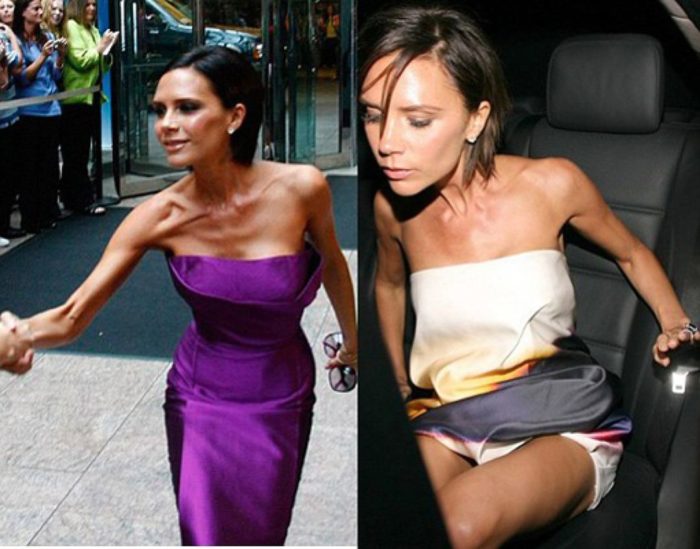
Victoria Beckham.
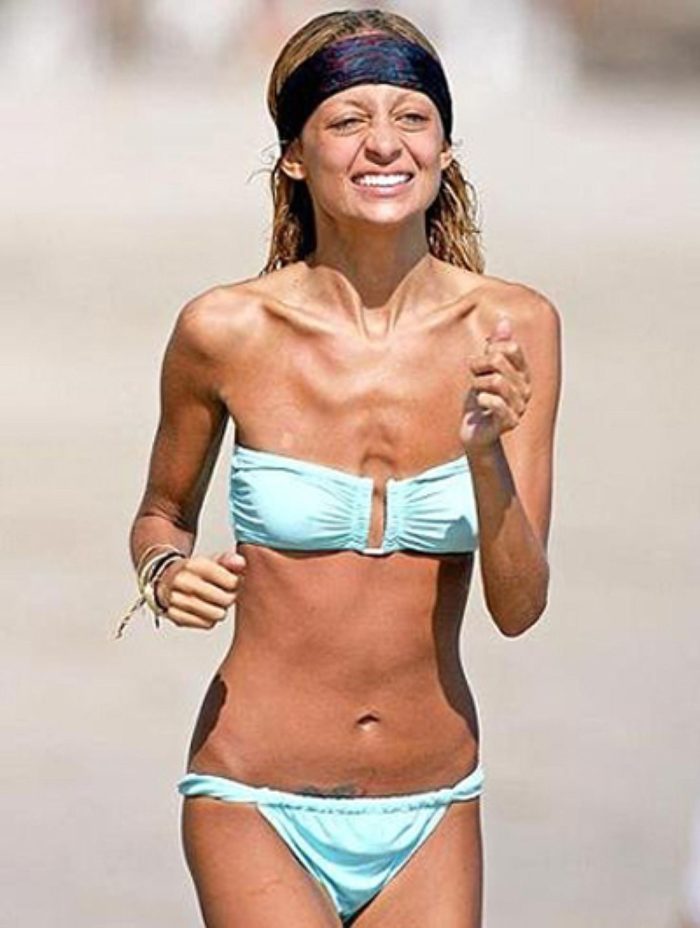
Nicole Ricchi.

Angelina Jolie.

Model Isabelle Caro.
Prevention of anorexia
Prevent anorexia in adults and children is possible if:
- fIILET FROM CHULT POWER HOME IN FAMILY
- fought right, balanced
- take into account the taste preferences of children
- competently approach to solve the problem of excess weight, lose weight, having enlisted the support of a specialist in nutrition and, if necessary, a psychologist
- in time to treat internal diseases
